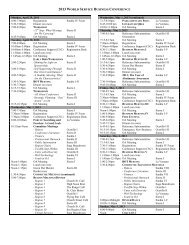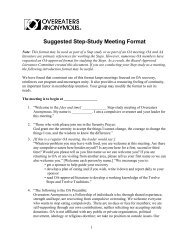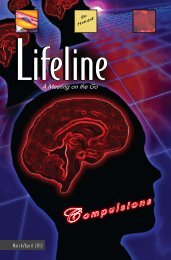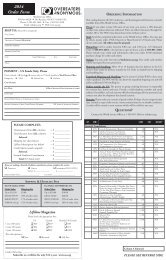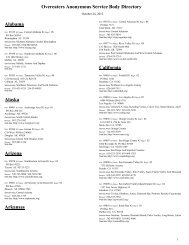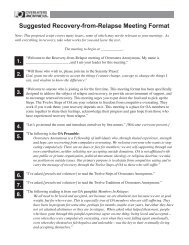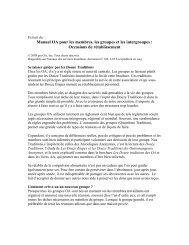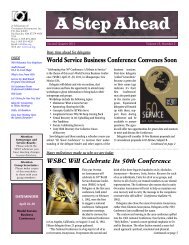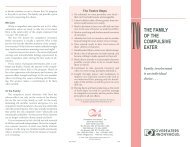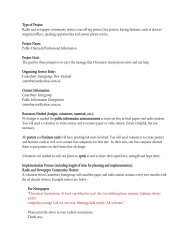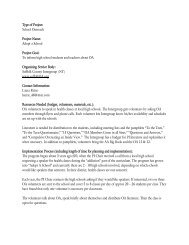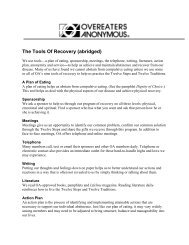sponsoring through the twelve steps - Overeaters Anonymous
sponsoring through the twelve steps - Overeaters Anonymous
sponsoring through the twelve steps - Overeaters Anonymous
Create successful ePaper yourself
Turn your PDF publications into a flip-book with our unique Google optimized e-Paper software.
438<br />
439<br />
440<br />
441<br />
442<br />
443<br />
444<br />
445<br />
446<br />
447<br />
448<br />
449<br />
450<br />
451<br />
452<br />
453<br />
454<br />
455<br />
456<br />
457<br />
458<br />
459<br />
460<br />
461<br />
462<br />
463<br />
464<br />
465<br />
466<br />
467<br />
468<br />
469<br />
470<br />
471<br />
472<br />
473<br />
474<br />
475<br />
476<br />
477<br />
478<br />
479<br />
480<br />
481<br />
482<br />
Do I need to pray for this person?<br />
Is it possible for me to make direct amends with this person?<br />
What is <strong>the</strong> best way for me to make amends for this situation?<br />
What behaviors do I need to change?<br />
Have I experienced forgiveness in <strong>the</strong> process of making some of my amends?<br />
After <strong>the</strong> sponsee has listed <strong>the</strong> people who have been harmed, <strong>the</strong> sponsor can<br />
review each name with <strong>the</strong> sponsee and discuss <strong>the</strong> harm done. Then <strong>the</strong> sponsee can write<br />
down what he or she might say to <strong>the</strong> person receiving <strong>the</strong> amends. Frequently <strong>the</strong> sponsor<br />
goes over <strong>the</strong> wording with <strong>the</strong> sponsee and encourages <strong>the</strong> sponsee to eliminate any blame<br />
directed toward <strong>the</strong> person to whom <strong>the</strong> reparation is to be made.<br />
A simple, appropriate amends might include a list of defects demonstrated by <strong>the</strong><br />
sponsee’s behavior, possibly with an example of an incident, and a sincere apology for<br />
harm done. Before making <strong>the</strong> amends, sponsor and sponsee might rehearse <strong>the</strong> apology<br />
toge<strong>the</strong>r, finding <strong>the</strong> balance of being honest and considerate without groveling.<br />
It’s often best to make face-to-face amends, but <strong>the</strong> sponsee can write a letter or<br />
make a phone call for long-distance apologies. Suggest that <strong>the</strong> sponsee pray before doing<br />
each amends, asking God’s guidance and remembering that a Higher Power is in charge of<br />
<strong>the</strong> outcome.<br />
Sometimes it’s not evident that <strong>the</strong> sponsee’s behaviors have harmed ano<strong>the</strong>r<br />
person, but <strong>the</strong> sponsee may harbor resentment or ill will toward that person. In such cases,<br />
suggest that <strong>the</strong> sponsee ask God to help him or her develop a compassionate, forgiving<br />
and tolerant view toward that person. However, sponsees must not let ill feelings stop <strong>the</strong>m<br />
from taking corrective measures if <strong>the</strong>y are warranted.<br />
Most amends will require not only that a sponsee apologize, but also change<br />
behaviors, correct wrongs and, if possible, repair damages. These actions are often called<br />
“living amends.” Sponsors and sponsees usually discuss <strong>the</strong>se thoroughly and develop a<br />
plan for future behaviors. If a person cannot be contacted or amends cannot be made,<br />
suggest alternative actions such as giving to o<strong>the</strong>rs in a selfless way. Explain that we have<br />
harmed ourselves in many ways, and we can make living amends to ourselves by making<br />
amends to o<strong>the</strong>rs.<br />
While making amends, a sponsee needs to understand that “except when to do so<br />
would injure <strong>the</strong>m or o<strong>the</strong>rs” does not mean injury to <strong>the</strong> sponsee from embarrassment,<br />
fear, discomfort, financial burden or shame. Injury to o<strong>the</strong>rs might include private<br />
information that could compromise employees, family members, friends or o<strong>the</strong>rs. It is<br />
critical to recovery for <strong>the</strong> sponsee to take direction from <strong>the</strong> sponsor regarding amends<br />
that may not be appropriate.<br />
Your support and guidance are vital in Step Nine. Sponsors who have taken this<br />
Step will be able to share <strong>the</strong> joy and relief that most amends bring. Occasionally<br />
reparations may not be well-received. The point of Step Nine is for sponsees to clean <strong>the</strong>ir<br />
side of <strong>the</strong> street and let go of <strong>the</strong> results, whe<strong>the</strong>r positive or negative. It is important to<br />
remind <strong>the</strong> sponsee that whatever happens when making amends, we become closer to<br />
God, more at peace with ourselves and better able to be of service to o<strong>the</strong>rs.<br />
After sponsees have begun to make amends, some sponsors introduce <strong>the</strong>m to Steps<br />
Ten, Eleven and Twelve, since some amends (such as financial) may take years to<br />
complete. O<strong>the</strong>r sponsors, however, feel it is beneficial to finish each Step before<br />
12



